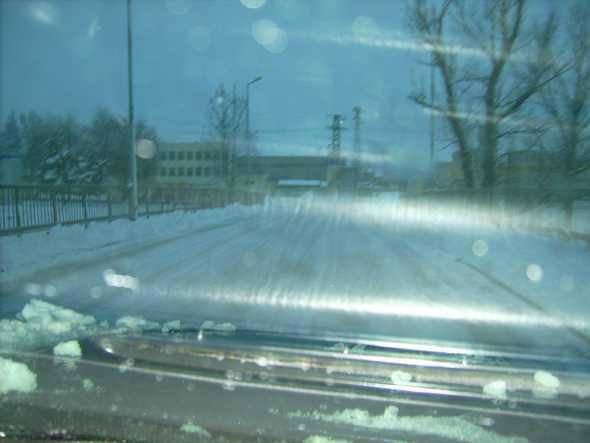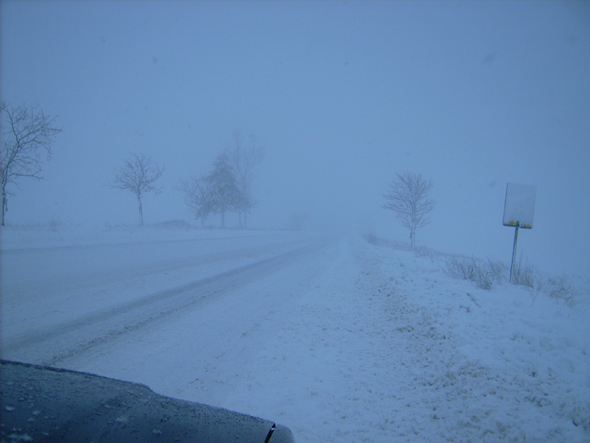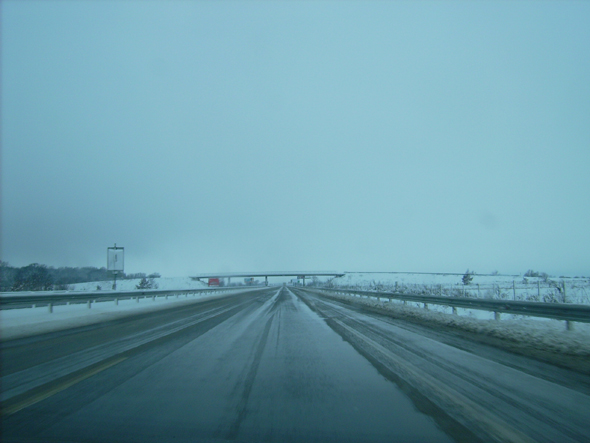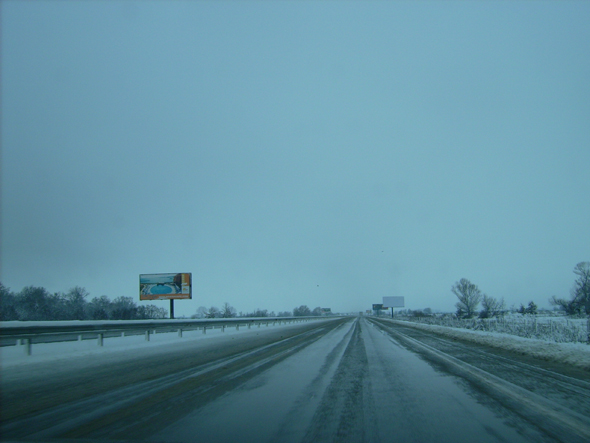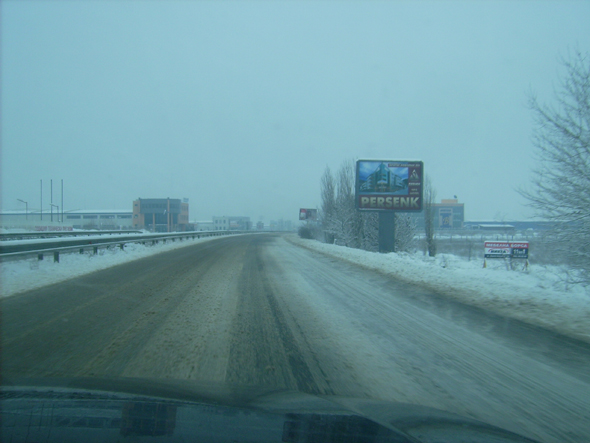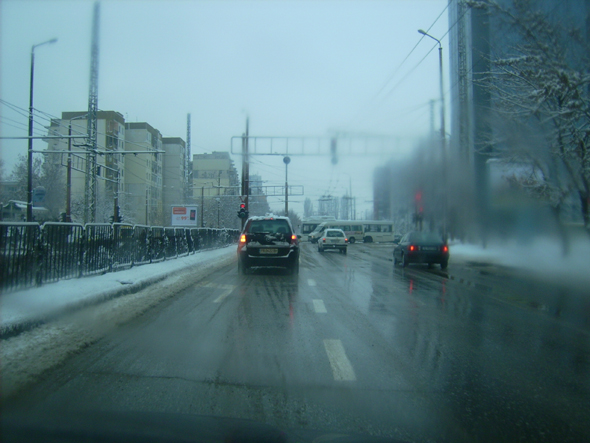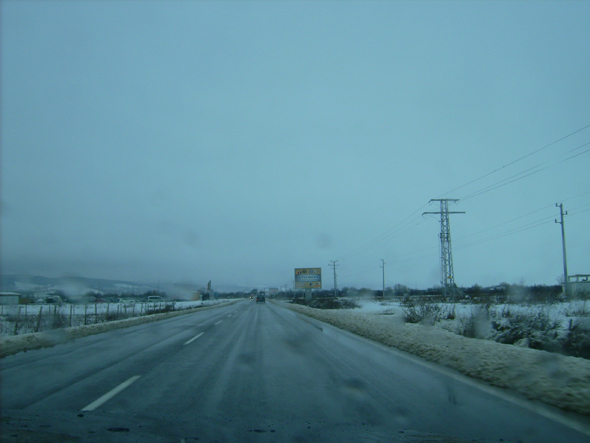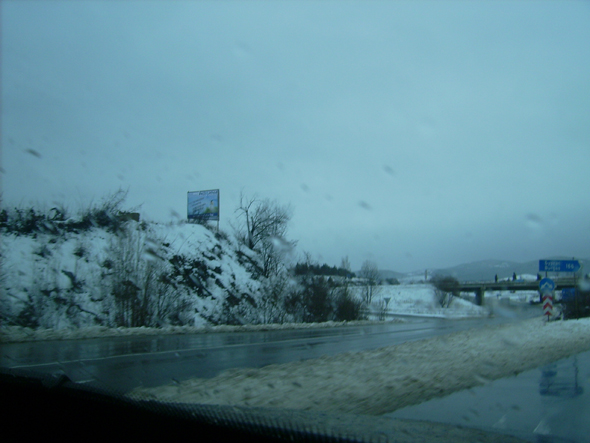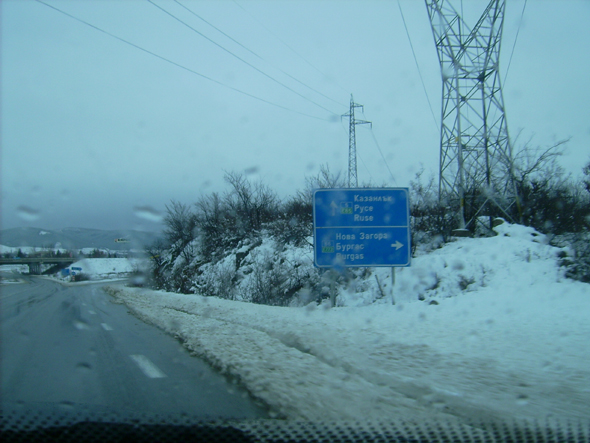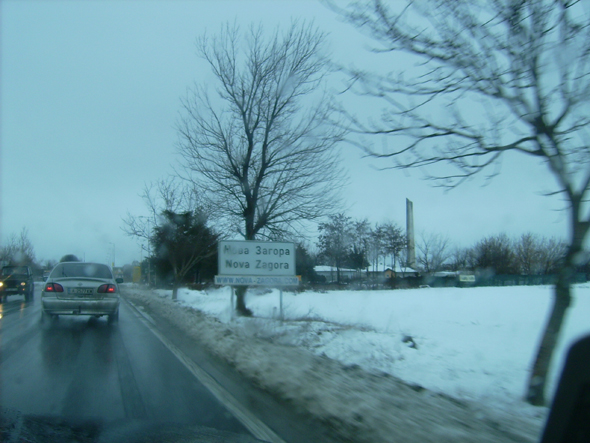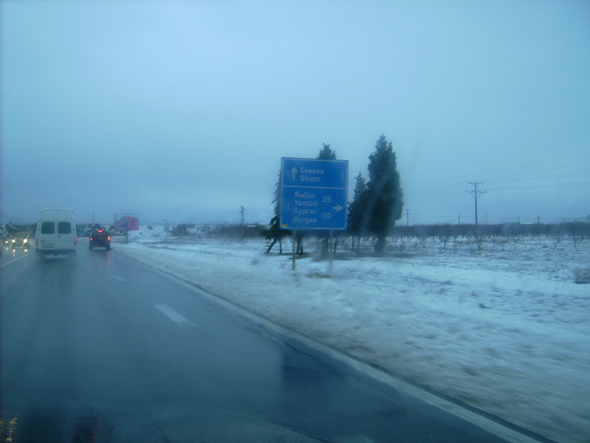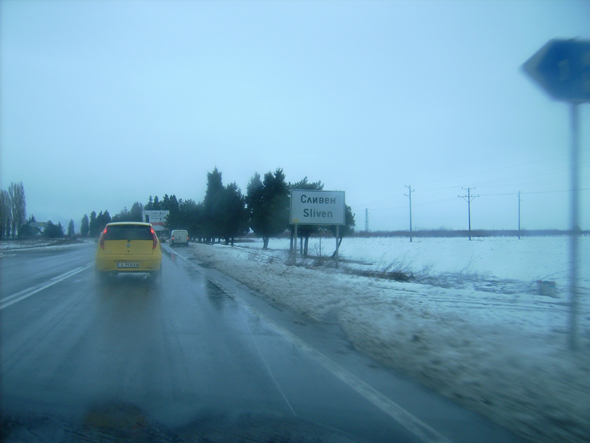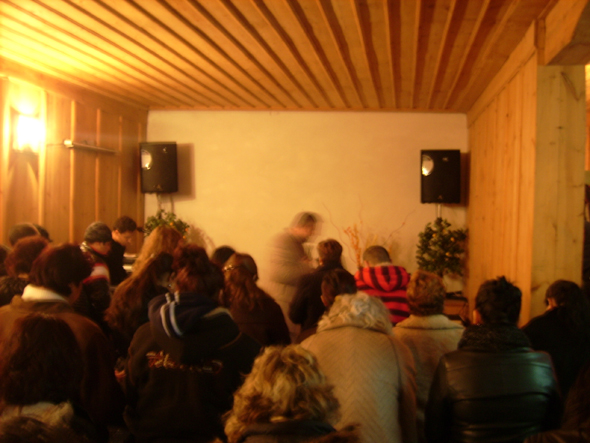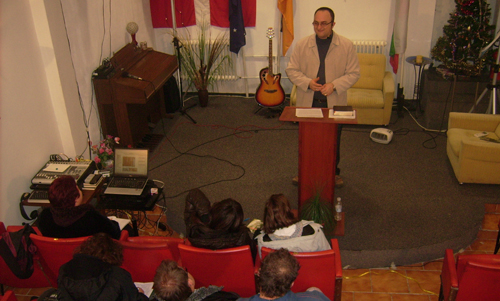Sunday Services in the Snow
Traveling during winter conditions in Bulgaria has never been easy. But it’s getting worse every year as temperatures drop lower and lower with record negative recordings. But ministry must continue regardless of the weather conditions. And there is a story in pictures of our ministry this past Sunday in blizzard conditions through the covered with snow Bulgaria:
7:30 AM: Early departure by dawn, defrosting the engine and heading out of town.

7:45 AM: A few minutes later still trying to leave Yambol, Bulgaria on our way to Sliven (25 miles north) to reach the Tricia Interstate. We stop to ask a southbound traveler of the road conditions ahead. The report is that while the roads are being cleaned they are simultaneously being recovered with snow.
8:00 AM: Heading out of Sliven west toward the city of Nova Zagora
8:15 AM: A few miles before the city Nova Zagora barely seeing the road ahead with falling snow and increasing fog.
9:00 AM: Reaching the interstate just pass the city of Stara Zagora where we were stopped by Police who inquired about road conditions and asked which direction we were traveling to ensure our safety.
9:20 AM: On the somewhat clean interstate attempting to make up for the lost time.
9:45 AM: Reaching the second largest Bulgarian city of Plovdiv also frozen under the snow to minister to some 150 members of the Apostolic Church of Bulgaria.
9:55 AM: Almost at the Apostolic Church of Bulgaria in Plovdiv, Bulgaria following our host to the church location.
3:00 PM: Heading back east after a long service and great fellowship afterwards in a hurry to our next ministry location in Sliven, Bulgaria.
3:30 PM: Not much improvement on the interstate, but thanks to the temperatures the snow is melting. We are very grateful. For Bulgaria this is normally the time in which the snow begins to freeze over after being melted by the noon time sun when temperatures permit.
4:00 PM: Passing Stara Zagora for a second time in one day.
4:15 PM: Quickly going through Nova Zagora as evening traffic begins to pick up.
4:30 PM: Passing the turn to our home office in Yambol to reach our ministry location in Sliven, Bulgaria.
4:55 PM: Entering Sliven under severe winter conditions, perhaps the worst we have seen all day, just in time for the evening service. The church is located in somewhat secluded back streets of the town which had not been cleaned all day.
6:15 PM: Altar call at the Antioch Project Church of Sliven, Bulgaria – worth every effort we have made for the ministry all day long.
Mobile Bible School in Bulgaria Implements Three New Courses
In the past six months in which we have implemented the mobile Bible school into the Bulgarian context of ministry, our team has added three more courses which will be included in our 2010 class program. They are:
1. Systematic Theology. This is a course that we developed back in 2001 to respond to the need for Bulgarian contextualized studies in systematic theology from a Pentecostal perspective. After teaching the course at the Pentecostal Department of the Bulgarian Evangelical Theological Institute, we published a small Sunday school series on the subject, which have since then been used for congregational Bible studies within the Bulgarian Church of God. We are planning to reprint this publication in 2010 and present the course not only to the students who study Bible doctrine, but also as a practical model for teaching Systematic Theology from a Pentecostal perspective in the context of the local church.
2. The Christian Chaplaincy course was first presented within the context of the Bulgarian Evangelical Theological Institute in 2006 as part of the educational program of the Bulgarian Chaplaincy Association. It purposes to introduce students to the ministry of the chaplain and help ministers recognize a calling to chaplaincy ministry they may have in their lives and set them forth to a higher level of education on the subject. The course has been taught several times in the past five years in various locations across Bulgaria and has been instrumental in the development of the Master’s Program in Chaplaincy, which we will begin teaching in September of 2010 in partnership with the Bulgarian Evangelical Theological Institute.
3. Demons, Disease and Deliverance is the latest class developed along with two Church of God pastors. Vasil Petrov and Plamen Petrov who have served with the Bulgarian Church of God for over two decades now. Their healing and deliverance ministries have extended beyond the borders of Bulgaria, as they are frequent guests to Bulgarian emigrant communities in Europe and the United States. Plamen Petrov is currently serving with the Bulgarian church in Malaga, Spain, while Vasil Petrov is a regional overseer for the Gabrovo Church of God region. They both hold weekly online programs on the subject of healing and deliverance and were instrumental in the developing of this class as practical training which the Mobile Bible School now offers as an online training course for ministers and lay leaders.
Ministering at the Fire Church of God in Sofia
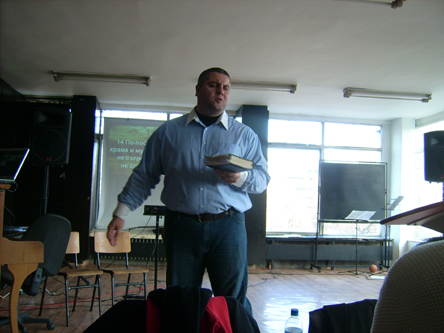 Returning to minster at the Fire Church of God in Sofia was a special event for our team. Many of the members there, as well as the pastor’s family, have been friends of ours and pastors in the ministry for a long time now. We have worked with Church of God Sofia regional overseer, Daniel Kirov and his team since 2002 when he first moved to Sofia with a vision to plant a church. Since then, his vision has become a reality in the capital as the Fire Church of God is one of the few active Church of God congregations in the largest metropolitan area in Bulgaria.
Returning to minster at the Fire Church of God in Sofia was a special event for our team. Many of the members there, as well as the pastor’s family, have been friends of ours and pastors in the ministry for a long time now. We have worked with Church of God Sofia regional overseer, Daniel Kirov and his team since 2002 when he first moved to Sofia with a vision to plant a church. Since then, his vision has become a reality in the capital as the Fire Church of God is one of the few active Church of God congregations in the largest metropolitan area in Bulgaria.
This time, we were able to focus on the new Bulgarian translation of the Bible, which we have now prepared for print, and present to the congregation an interactive Bible study from the Gospel of John. It was encouraging again to watch the small, but growing congregation, interpret the Bible corporately in a Bible study that enlightens the mind and transforms the soul. It was the way the Bible was intended to be read and interpreted, understood and lived – among true brothers and sisters.
Bible School and Services at the Mission Church in Sofia
We are just returning from a powerful weekend of teaching in Sofia. With temperatures below zero and snow covering the larger part of Bulgaria, we travelled to the capital city to minister at the Mission Church there. The church is only a couple of years old, but we have worked with the pastor and the leadership team for over a decade now as part of our Church of God ministry and the Bulgarian Chaplaincy Association as well.
Since April, 2009 the Mission Church has had services in the heart of the Sofia metropolitan of some 2.5 million people living in it. The church started with a handful of folks and now has some 120 members in their regular meetings, a Bible school, home group program, arts program and a very powerful praise team and choir that have held several successful concerts already.
Our visit was connected with a series of lectures on New Testament interpretation at their Bible school and ministering in their Sunday service. Although the school has only 30 students, we felt a powerful presence during the lectures and were able to extend the material and connect on a more personal level with the students. Naturally, the Sunday service became a great continuation of what we had already completed with the students. During the first song of worship, a demon possessed man ran to the altars screaming and rolled on the ground, only to be delivered a few minutes later. Then, the preaching took the attention of the people in the congregation, followed by an alter service in which many rededicated their lives praying to God to bring them to a new spiritual level in their Christian walk. Along with the pastor and his family, we were blessed to observe the Word working within the people and changing their lives forever.
Mobile School Travels to Gabrovo
Regardless of the severe freezing weather, our Mobile Bible School traveled to Gabrovo during the month of January for a special seminar on “Demons, Disease and Deliverance” committed to the excellence of education and discipleship. With almost fully blinding fog, it took us a while to cross the Shipka pass of the Balkans that separates Northern and Southern Bulgaria. When we arrived in Gabrovo, more difficulties were waiting for us. A power serge caused by the weather had damaged electrical devices in the sanctuary we were meeting at including the heating system and the power point projector.
And there we were ready to teach and be taught with temperatures outside already bellow zero. So, we prayed and classes began with Church of God regional overseer Vasil Petrov presenting three powerful modules on the subject at hand. About the middle of the second period, while talking about dealing with demon possessed people in church, he felt lead to begin singing a song and invited the worship team to join him. As soon as we reached the course of the song with the words “Come Holy Spirit”, we heard the heating system beginning its warming cycle and by the time we were done with worship, the whole sanctuary was warm.
Teaching continued all day and we finished the seminar with a great altar call service, in which many were prayed for, several were delivered and healed, and one man received the baptism with the Holy Spirit after we laid hands on him. Late in the afternoon, many departed to return to their respective locations. Our team stayed behind for the service next morning. We had a great time of fellowship and prayer, strategizing for the time ahead of us and the strategic course of action we felt lead to take in 2010 as a church. When Sunday morning came, we headed up to the sanctuary only to discover that the power point projector and screens were fully working again without anyone trying to fix them. And we all rejoiced during the service, as the Holy Spirit delivered a prophetic message for 2010 while we witnessed miracles happening before our very eyes.
The response from this particular module of the Mobile Bible School had a great connotation not only through the churches and regions represented during the classes, but also among the hundreds of people who watched it online via our ministry website. We are already planning a second part of the module that is intended as an advanced level course on the subject of “Demons, Disease and Deliverance.”
Bulgarian Evangelical Church Analysis 2010
1. The growing number of visitors of evangelical churches, caused by the socio-economical factors in 2010, will demand a time sensitive model for church conflict resolution and the restoration of church-wide unity. In this process, the evangelical preaching must adequately include the Bible teachings of forgiveness, agreement and unity.
2. In the context of the socio-economic crises and the inadequacy of traditional religion in 2010, more celebrities and politicians will show interest toward the evangelical churches and the elements of their services. It is a time for evangelical preaching to leave the four walls of the church and to juxtapose the Biblical standard for living as the social bases for building society.
3. The finalization of major church building projects in 2009-2010 will relieve a number of congregations from rent obligations, thus releasing more resources and funds despite the crises. The recipients of this blessing must use their buildings to relieve other evangelical churches from rent obligations in their respective regions, thus overcoming the feeling of power and priority and actualizing the vision of the Kingdom for brotherhood and unity. A church building could be used by 3-5 midsize congregations with a suitable program of services and a common Sunday service. The given blessing will either become a blessing for others or be taken way.
4. The search for responsibility from leadership as a whole is a process, which is constantly present within the evangelical movement with a special focus in the last 20 years. In regard to the said financial freedom in 2010, this search must be brought to an adequately working and properly contextualized model for leadership, which includes not only economical, but spiritual responsibility on the part of church leadership as well. It is impossible to define a life of holiness outside of the context of social relationships.
5. The opening of secret police dossiers belonging to leading religious leaders from the past and the present, purposes the destabilization of a unified and growing evangelical movement. Nevertheless, it is a process which must occur and a road that must be travelled by the Church in order to remove the unnecessary suspicions conceived by temporary external to the church factors. In this process, the guilty ones must humble themselves, while the hurt ones must forgive in order that the unity of the church is restored again.
6. Every persecution is a result of a broken balance in the relationship between church and state. Strong confrontation and persecution toward evangelical churches in 2010 is the natural result from the gradual increasing in restrictions of religious liberty and human rights. But in the struggle the Church does not weaken. On the contrary, the evangelical church knows how to heal in the processes of persecution and therefore they must be viewed as purification of the church for growth.
7. The increase of cases of religious persecution in 2010, in which the state religion aims at alternative faith communities in order to hide its own inadequacy in a given crises moment, may vary from a political position of the Church in society to creating a spiritually healthy new generation. These dynamics are results from the furious misbalance between the social position of the state church and its spiritual bankruptcy.
8. Within the lack of balance in the relationship between church and state, every change in the Religious Law in 2010 will result in a negative connotation toward evangelical churches. The society is unready to accept the protestant faith as a standard, although it applies it subconsciously in all social spheres – from culture to economy. There is no successful capitalist society without protestant values, and this fact must be realized by all church leaders.
9. The increasing return of immigrants back to Bulgaria in 2010, due to the prolonged economical crises in Europe, will create a flow of new thinking, ideas and dynamics in the Church, but it will not decrease the intensity of establishing new Bulgarian immigrant congregations in foreign lands.
10. After 20 years of democratic changes within the society and the church, in 2010 a new generation of leaders reaches adulthood. Teams of various church ministries enter a new level of professionalism. The church itself becomes socially aware rediscovering its own spiritual role and redefining its historical identity in a postmodern and post communist context. All this leads to the increase in the need for systematic studying and responsible practice of the principles of church leadership. In this context, the processes of returning to the first love, spirituality and unity are a must. The recognition of the need for such revitalization can in a moment change the status of the Church in history. The lack of recognition will doom the Church to a historical failure.


